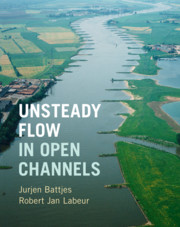Book contents
- Frontmatter
- Contents
- List of Symbols
- Preface
- 1 Basic Equations for LongWaves
- 2 Classification and Analysis of LongWaves
- 3 ElementaryWave Equation
- 4 TranslatoryWaves
- 5 Method of Characteristics
- 6 TidalBasins
- 7 HarmonicWave Propagation
- 8 FloodWaves in Rivers
- 9 SteadyFlow
- 10 Transport Processes
- 11 Numerical Computation of Solutions
- Appendix A Pressurized Flow in Closed Conduits
- Appendix B Summary of Formulas
- References
- Author Index
- Subject Index
10 - Transport Processes
Published online by Cambridge University Press: 09 February 2017
- Frontmatter
- Contents
- List of Symbols
- Preface
- 1 Basic Equations for LongWaves
- 2 Classification and Analysis of LongWaves
- 3 ElementaryWave Equation
- 4 TranslatoryWaves
- 5 Method of Characteristics
- 6 TidalBasins
- 7 HarmonicWave Propagation
- 8 FloodWaves in Rivers
- 9 SteadyFlow
- 10 Transport Processes
- 11 Numerical Computation of Solutions
- Appendix A Pressurized Flow in Closed Conduits
- Appendix B Summary of Formulas
- References
- Author Index
- Subject Index
Summary
This chapter deals with the transport of dissolved or suspended matter or heat in free-surface flows. This subject is of great importance in the context of problems of water quality, sedimentation, erosion etc. The present chapter is restricted to so-called passive transports, based on the assumption that the presence of the transported matter or heat in the water does not affect the flow. This restricts the treatment to relatively low concentrations, such that the bulk density and the bulk viscosity are affected to a negligible degree only. However, a warning is in order here. There are numerous situations in which this approximation does not hold. A well-known example is the effect of salinity variations on the fluid density, which in estuaries, for instance, is sufficiently strong so as to affect the flow significantly. Likewise, effects of temperature variations and high concentrations of fine suspended sediments occurring in practice are often not negligible. Nevertheless, as stated, these effects are ignored in the present introductory chapter. A detailed account, also treating flows induced by density differences, can be found in Fischer et al. (1979) and Rutherford (1994).
Introduction
We distinguish the following types of physical transport processes, in order of increasing length scale:
Molecular diffusion: the time-averaged value of fluctuating micro-transports due to random thermal molecular motions (Brownian motion in fluids)
Advection: transports following the fluid at continuum scale
Turbulent diffusion: the time-averaged value of fluctuating advective transports due to turbulent motion of finite fluid ‘parcels’
Dispersion: mixing arising in the two-dimensional or one-dimensional modeling of three-dimensional transports due to integration over the depth or the cross section of a water course.
The larger the scale considered, the higher the transport rates are. We start the modelling of transport processes with the formulation of a generic balance equation, not restricted to a particular type of transport or of transported substance. Thereafter, the types of transport mentioned above are dealt with in succession.
Generic Balance Equation
In order to avoid the complexities of the derivation and solution of transport equations in curvilinear coordinates (s, n, b), we will temporarily use Cartesian coordinates (x, y, z).
- Type
- Chapter
- Information
- Unsteady Flow in Open Channels , pp. 185 - 210Publisher: Cambridge University PressPrint publication year: 2017



